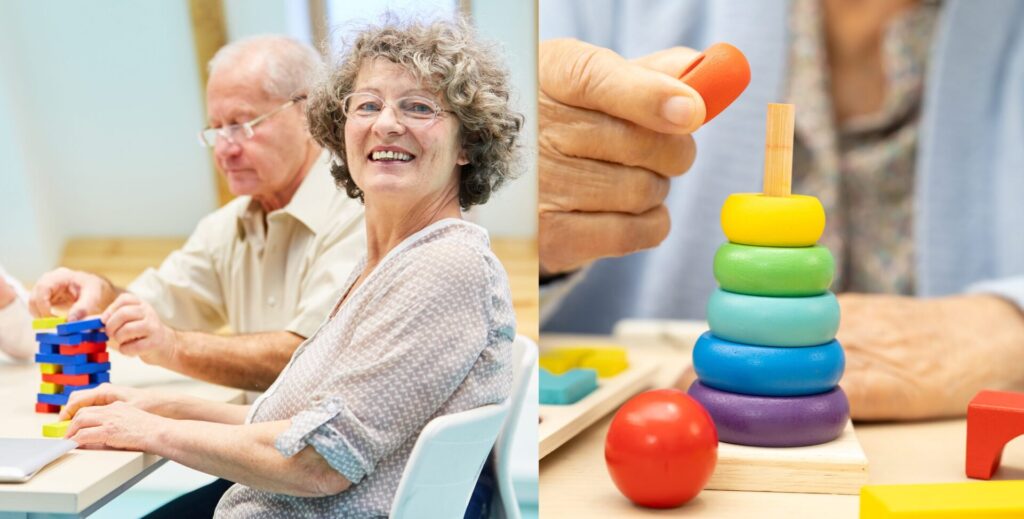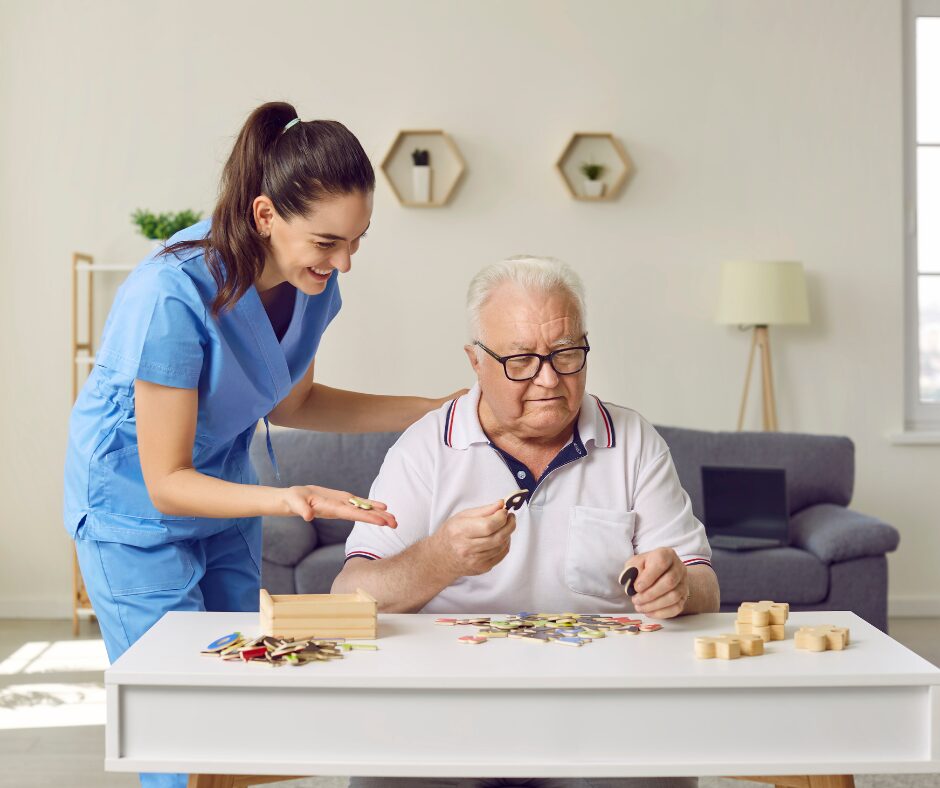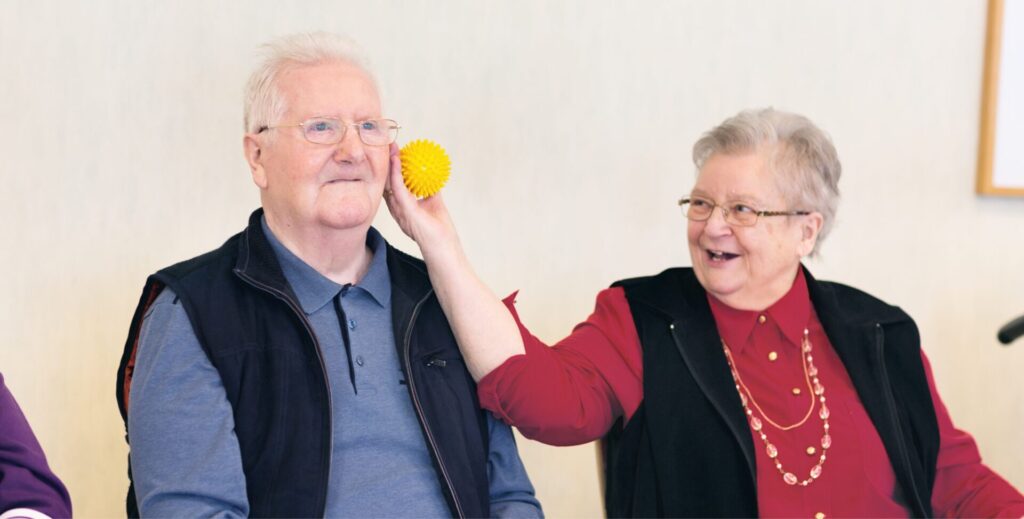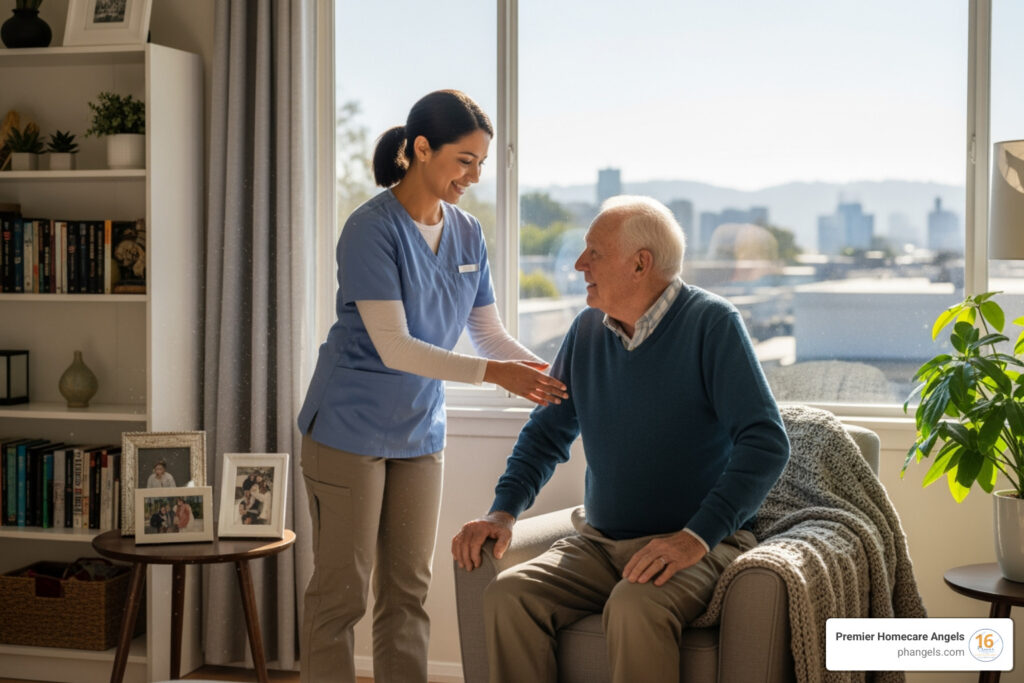Alzheimer’s disease and other types of dementia impact millions of people worldwide. In 2024, more than 6.9 million Americans aged 65 and older are living with Alzheimer’s, and this number continues to increase. California, which has one of the largest senior populations, is particularly affected.

Providing support to individuals with Alzheimer’s and dementia, especially seniors, is more important than ever. These individuals often experience emotional, mental, and physical challenges. As cognitive functions change, their surroundings can feel confusing and isolating.
This article will discuss practical ways to offer support, why it matters, and how proper care can improve quality of life for those affected by Alzheimer’s and dementia.
Understanding Alzheimer’s and Dementia
What Is Alzheimer’s Disease?

Alzheimer’s disease is a progressive brain disorder that gradually destroys memory, thinking skills, and the ability to perform everyday activities. It typically develops slowly and worsens over time, eventually impairing a person’s ability to carry out even simple tasks such as dressing, eating, or recognizing loved ones. People with Alzheimer’s and Dementia often face increasing challenges as the disease advances, requiring greater support and care to maintain their quality of life.
What Is Dementia?
Dementia is not a single disease but a broad term used to describe a decline in mental ability severe enough to interfere with daily life. It affects memory, reasoning, judgment, and communication. Alzheimer’s disease is the most common form of dementia, accounting for 60-80% of cases. Other types include vascular dementia, Lewy body dementia, and frontotemporal dementia.
California’s Growing Concern
In California, the impact of Alzheimer’s disease is significant and growing. According to the California Department of Public Health, over 690,000 Californians aged 65 and older are currently living with Alzheimer’s. Due to the state’s large and aging population, this number is expected to increase by more than 70% by 2040, presenting major challenges for healthcare systems, families, and communities throughout California.
The Importance of Helping People with Alzheimer’s and Dementia
Why Personalized Care Makes a Difference
Caring for individuals living with Alzheimer’s or dementia involves more than just daily assistance. Thoughtful support can help promote comfort, confidence, and quality of life by:
- Encouraging independence in daily routines
- Supporting social connection to ease feelings of isolation
- Offering emotional reassurance to help with daily challenges
- Providing engaging activities to support mental stimulation
With compassionate care tailored to their needs, individuals can experience more comfort in their daily lives, and families gain peace of mind knowing their loved ones are receiving thoughtful, respectful support.
Supporting Dementia Care with Compassion
Studies suggest that providing compassionate, personalized care can help individuals with dementia feel more supported and comfortable. This type of care may promote a positive mood and encourage emotional well-being. Offering patience and understanding can truly make a meaningful difference in their daily lives. (Source: www.apa.org/monitor/2023. )
Challenges Faced by Individuals with Alzheimer’s and Dementia

Memory Difficulties and Confusion
Memory challenges are common for people living with Alzheimer’s and dementia. This can be frustrating and worrying for both the individual and their family. Everyday activities like dressing, cooking, or keeping track of appointments may become harder. Recognizing familiar people and places might also be a challenge, which can cause confusion and stress.
Social Withdrawal and Feeling Alone
As the condition progresses, many seniors may reduce their social interactions. This often happens because they feel misunderstood or find communication difficult. The decrease in social contact can lead to feelings of loneliness, which may affect emotional well-being.
Caregiver Stress
Caring for someone with Alzheimer’s or dementia can be very demanding. Family members and caregivers often experience high levels of stress and fatigue, especially without enough support or breaks. This can impact their own health and make caregiving more challenging.
Safety Concerns
People with these conditions may face safety issues like wandering, forgetting medications, or poor judgment. They might leave home unintentionally or be at risk of falls and accidents. Ensuring a safe and supervised environment is important to help keep them protected.
Understanding these challenges helps in providing thoughtful and supportive care for those affected by Alzheimer’s and dementia.
How to Help People with Alzheimer’s and Dementia

Caring for someone with Alzheimer’s or dementia can be challenging, but there are many effective ways to make their lives easier and more comfortable. Here are some helpful strategies:
1. Be Patient and Understanding
People with dementia may take longer to process information or express themselves. Listen carefully and give them time to respond. Repeat information calmly if needed, without showing frustration. Avoid arguing or correcting them, as this can cause stress. Instead, acknowledge their feelings and gently guide the conversation.
2. Create a Safe Environment
Safety is very important because those with dementia may be more likely to fall or get lost. Remove trip hazards like loose rugs or clutter. Use grab bars in bathrooms and other areas to prevent falls. If wandering is a concern, consider door locks or alarms to keep them safe. A calm and familiar space helps reduce confusion.
3. Encourage Daily Routines
Consistent daily routines can help reduce stress and confusion. Try to keep meal times, personal care, and activities on a regular schedule. Keep routines simple and avoid sudden changes. Use gentle reminders and clear instructions. Celebrate small achievements to build confidence.
4.Promote Healthy Habits
Good health supports brain function and overall well-being. Encourage physical activities they can manage, like walking or stretching. Offer a balanced diet with fruits, vegetables, whole grains, and healthy fats. Make sure they drink enough water and have a regular sleep schedule, as dehydration and poor sleep can increase confusion.
5. Use Memory Aids
Memory tools can help with daily tasks. Label drawers, cabinets, and rooms to assist with finding things. Photo albums with names can help trigger memories. Use calendars, clocks, and visible reminders to track appointments and activities. These aids help maintain independence and engagement.
Providing compassionate care improves quality of life and strengthens the relationship between caregivers and loved ones. With patience and practical support, you can make a positive impact every day.
6. Offer Meaningful Activities
People with Alzheimer’s and dementia continue to enjoy activities that bring comfort and joy, especially those that evoke positive feelings or happy memories. Meaningful activities provide a sense of purpose and can help reduce anxiety and restlessness. Some good options include:
- Music therapy: Listening to familiar songs can trigger memories and emotional connections, even when other memories fade.
- Arts and crafts: Simple creative projects allow self-expression and a feeling of accomplishment.
- Puzzles and games: These help support cognitive function while being fun and engaging.
- Walks in nature: Fresh air, sunlight, and the calming environment of nature benefit emotional and mental health.
7. Stay Socially Connected
Maintaining connections with loved ones helps prevent loneliness often experienced by individuals with dementia. Even short, regular interactions can improve mood and foster a sense of belonging. Encourage:
- Phone or video calls with distant family members
- Meaningful visits from friends
- Participation in community or senior-friendly group activities when possible
Regular social interaction can support cognitive health and strengthen emotional resilience.
8. Educate Yourself as a Caregiver
Caring for someone with Alzheimer’s or dementia requires knowledge, patience, and adaptability. Understanding the condition helps you provide better care and compassion. Consider:
- Reading reliable information about dementia and its stages
- Attending caregiver workshops or online courses
- Joining caregiver support groups to connect with others in similar situations
- Education empowers you to handle challenges confidently and offers emotional support through community connections.
Education empowers you to handle challenges confidently and offers emotional support through community connections.
9. Use Professional Services
Professional dementia care can provide vital support. Organizations like Premier Homecare Angels offer:
- Personalized in-home care tailored for seniors with Alzheimer’s and dementia
- Respite care, allowing family caregivers time to rest
- Expert advice on symptom management and safety
With experienced caregivers, families can feel confident their loved ones are in good hands. Learn more at www.phangels.com.
10. Remember the Caregivers
Caregivers play a crucial role in the well-being of people with dementia. Their hard work often goes unrecognized, and without support, they risk exhaustion. It’s important to:
- Provide caregivers with breaks to recharge
- Show appreciation through kind words or small gestures
- Encourage seeking help via counseling, support groups, or respite care
Supporting caregivers ensures they can continue providing the loving care their family members need.
How Premier Homecare Angels Supports Seniors Living with Dementia

At Premier Homecare Angels, we know that dementia affects more than memory. It can influence confidence, independence, relationships, and daily activities. We understand how challenging these changes can be for families to manage alone. That’s why we provide compassionate and dependable support every step of the way.
- Experienced Dementia Care Professionals – Our caregivers receive specialized training to understand the behaviors, needs, and communication styles of those living with Alzheimer’s and other types of dementia. With patience and kindness, they create a safe and supportive environment where seniors feel respected and cared for.
- Personalized Care Plans – Each person is unique. We customize care plans to fit the specific needs of every senior and their family. Whether assistance with daily tasks, personal care, medication reminders, or companionship, our focus is on maintaining dignity and improving quality of life.
- Support for Families – We know that families also need support. We offer guidance, regular updates, and a listening ear to help families feel confident, informed, and supported throughout their caregiving journey.
For families in Alameda County and surrounding areas, Premier Homecare Angels is more than a service provider — we are a trusted partner dedicated to enhancing comfort, connection, and peace of mind for seniors and their loved ones.
June: Alzheimer’s & Brain Health Awareness Month
Every June, we recognize Alzheimer’s and Brain Health Awareness Month—a time to raise understanding about brain health and support those affected by Alzheimer’s and related conditions. This month encourages education, compassion, and community involvement.
Caregivers, healthcare professionals, and advocates unite to share helpful information on maintaining brain health at every age. It’s also a moment to appreciate families and caregivers who provide daily support with kindness and dedication.
Advances in Alzheimer’s Research
While there is currently no cure for Alzheimer’s, ongoing research is helping improve early diagnosis and treatment options. Some recent developments include:
- New Treatments: Approved medications are now available that may help slow early-stage Alzheimer’s progression, focusing on more than just symptoms.
- Healthy Lifestyle Impact: Studies suggest that diet, exercise, mental activities, and social connections can support brain health and may lower the risk of cognitive decline.
- Early Detection Tools: Technologies like AI, wearable devices, and advanced imaging are enhancing early diagnosis and personalized care possibilities.
To learn more about brain health, caregiving support, and ways to get involved, visit reputable organizations such as the Alzheimer’s Association and the National Institute on Aging.
Together, we can support progress and work toward a brighter future for all affected by Alzheimer’s.
How Families Can Make a Difference

Supporting the Alzheimer’s and dementia community can start with simple actions that truly matter. Families can take meaningful steps to raise awareness, offer support, and deepen their understanding:
- Join Local Awareness Walks and Fundraisers
Participating in community walks and events helps raise funds for research and connects you with others facing similar challenges. Every step moves us closer to a brighter future. - Volunteer for Respite Care Programs
Giving your time to support caregivers through respite services offers them valuable breaks. Even a few hours can positively impact their well-being. - Share Your Story Online
Talking about your family’s experience helps reduce stigma and shows others they are not alone. Your voice can educate and inspire action. - Have Open Conversations About Brain Health
Discussing memory changes, healthy habits, and early signs of dementia encourages early care and better planning. It’s always a good time to start these important talks.
By getting involved, families play a key role in advancing care, understanding, and lasting change.
Why Support Makes Life Easier
Providing consistent care for someone with Alzheimer’s or dementia is more than managing symptoms—it’s about enhancing their quality of life. The right care benefits not only the person with memory loss but also their entire family, offering comfort, hope, and stability during challenging times.
When someone receives thoughtful, ongoing support:
- They feel safer and more secure, experiencing less anxiety throughout daily activities.
- They can maintain dignity, comfort, and a sense of identity, even as their needs evolve.
- Their loved ones gain peace of mind, knowing professional assistance is available and they are not alone.
For adult children caring for aging parents, dependable support services such as in-home care, respite care, or companionship can be a lifeline. These services ease the emotional and physical demands of caregiving, helping to prevent burnout and restore balance. Most importantly, they allow families to rebuild meaningful connections and enjoy moments together without constant worry.
This type of care provides both practical help and valuable emotional relief. It creates space for families to focus on what truly matters: love, presence, and genuine connection. With the right support, families can move beyond simply managing dementia’s challenges and start to live and thrive together once again.
Compassionate Care for People with Alzheimer’s and Dementia

Caring for someone with Alzheimer’s or dementia is a meaningful and important responsibility. It requires patience, kindness, and respect every day. Whether you are a family member, caregiver, or supporter, your efforts make a positive difference in the lives of those affected.
With the right knowledge, ongoing support, and empathy, we can help improve the experience for people living with memory loss and their loved ones. Even small acts of care and understanding help build a stronger, more supportive community.
This June and throughout the year, let’s raise awareness, offer hope, and provide encouragement to those who need it most. Together, we can support those impacted by Alzheimer’s and dementia and help create a brighter future.
Support and Care for Alzheimer’s and Dementia
If you or someone close to you is managing Alzheimer’s or dementia, reliable assistance is available. At Premier Homecare Angels, we provide compassionate support tailored to families’ needs.
???? Call us today at 510.227.5391
???? Email: info@arcanebot.dreamhosters.com
???? Visit: www.phangels.com
Whether you seek professional care services, helpful caregiving advice, or simply understanding, we are here to assist you. Follow Premier Homecare Angels on Facebook for useful information and resources designed to support your caregiving journey.
(Source:pmc.ncbi.nlm.nih.gov, www.latimes.com/california/newsletter )






